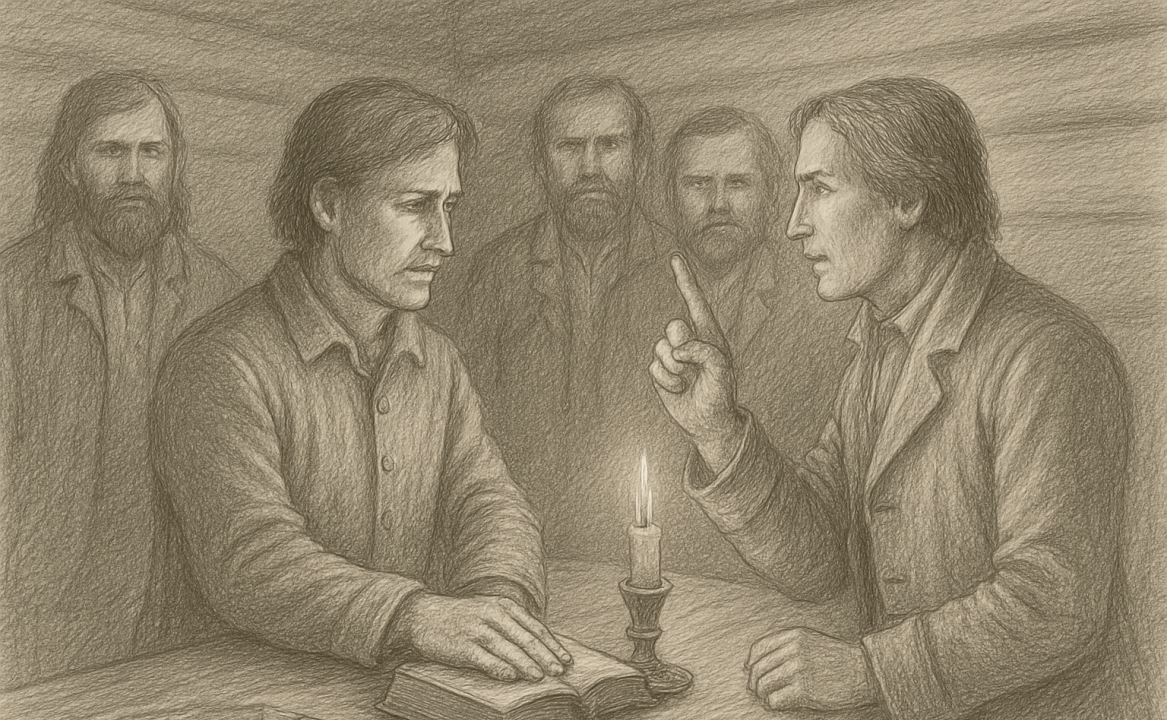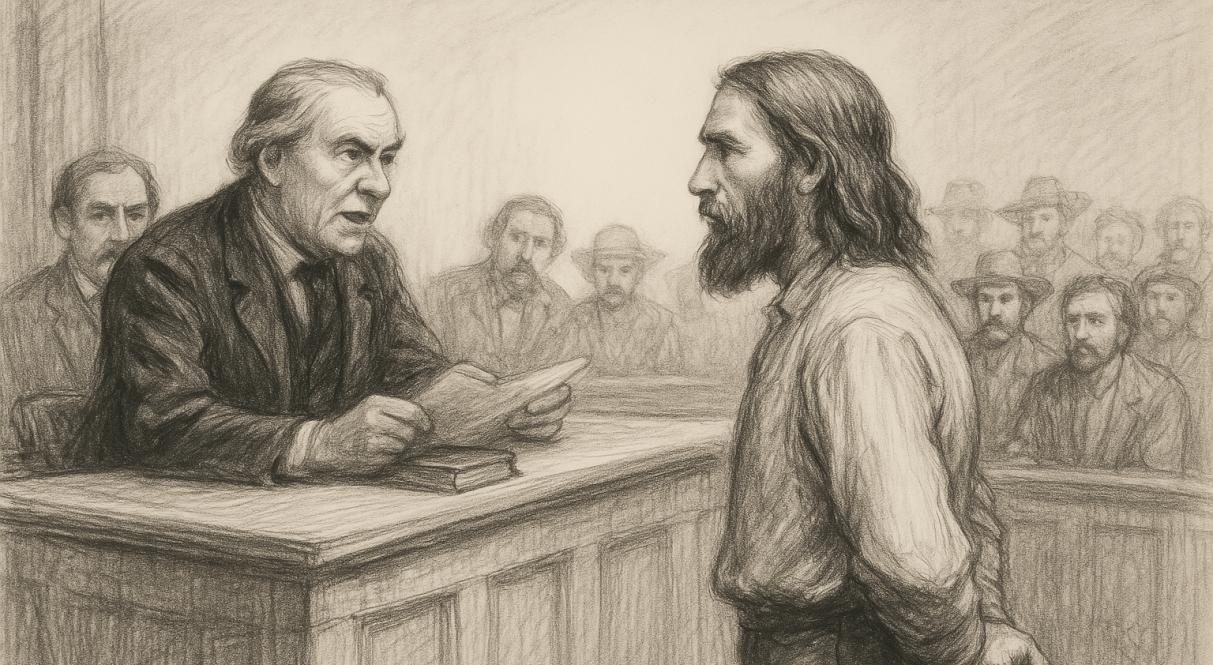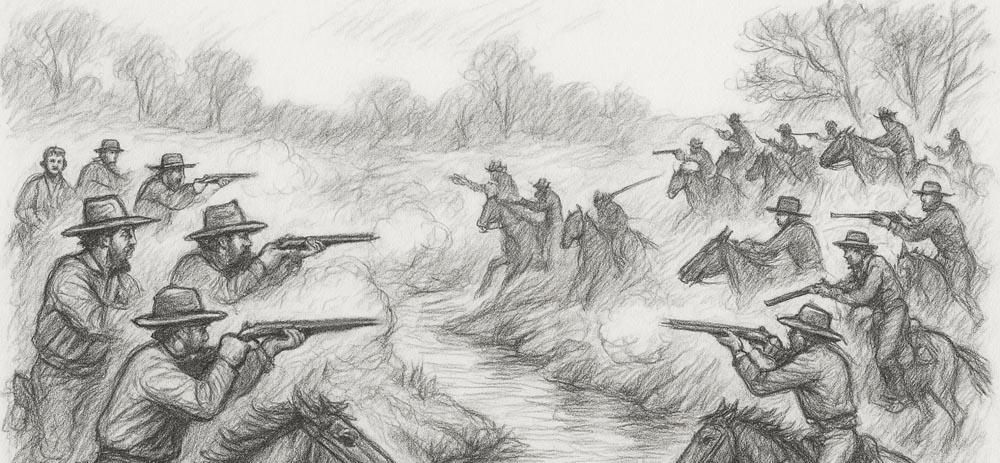Porter Rockwell and the Danites: Faith, Fire, and the Missouri Conflict
In the violent crucible of 1830s Missouri, where persecution followed Latter-day Saints from town to town, a secretive and controversial group emerged from within their ranks: the Danites. Among them stood a man whose name would become legend—Orrin Porter Rockwell. To understand Rockwell’s role, one must understand both the chaotic world that gave rise to the Danites and the nature of the man himself.
The Origins of the Danites
The Danites were formed in the summer of 1838 in Far West, Missouri, during a period of escalating tensions between Latter-day Saints and their Missouri neighbors. Saints had been driven from Jackson County, then Clay, and now faced threats in Caldwell and Daviess counties. Some saints had organized in order to drive out a number of “dissenters” and it was on the backbone of that success that the local violence started up once again.
Mobs burned homes and shot at settlers. Law enforcement offered no help. Judges and courts refused to support the saints and the former Lieutenant Governor Boggs who participated in the violence against the saints back in Jackson County was now the actual Governor of the state and continued to look for excuses to organize against the church. In response, some church members organized a defense society, swearing loyalty to church leaders and pledging to protect the Saints.

Sampson Avard, a physician and elder in the Church, played a leading role in organizing this secret militia. He called them the “Sons of Dan”—a biblical nod to vengeance and judgment (after other names were tried and rejected). Their goals, as Avard described them, were to uphold the Kingdom of God, protect the Saints, and prepare the way for divine rule. Avard claimed divine sanction, telling captains in the organization: “I have called upon you here today to teach you, and instruct you in the things that pertain to your duty, and show you what your privileges are, and what they soon will be.”
The group had all the hallmarks of a secret band. They had secret passphrases and signs given to each other to identify other brothers of the group. They swore an oath which has been documented at least in part. While perhaps many who joined the group did so thinking it would be a peaceful resistance to the threat of violence it soon become clear that wasn’t the case.
Leaders within the group started to push back when Avard laid out plans to fight violence with violence, proactively. And not just against the tormenting Gentiles, but also against saints or former saints who were identified as being a hurdle with the cause.
Eventually it caved in on itself and the group didn’t survive long.
Was the Group Sanctioned by the Church?
This question has divided historians and Latter-day Saint commentators alike. Avard himself would later testify in court that the Danite society was organized with church backing, but leaders including Joseph Smith denied such authorization. In fact, Avard turned state’s evidence in late 1838 to avoid imprisonment and accused the Prophet of forming the Danites with treasonous intent. His testimony became a central piece in the Missouri government’s prosecution of church leaders.

Yet other evidence clouds the picture. John Corrill, a church member and contemporary, called Avard “the most perfect villain he had ever seen,” but still confirmed the Danites’ existence and their oath-bound structure. Morris Phelps admitted attending Danite meetings, and Allen Joseph Stout wrote in his journal that the only crime ever proved against him was Danite membership—but that “they could find no law on the case.”
While there are many journal entries and other surviving documents about the group, nothing exists that shows the group was founded by or supported by leaders of the church. Purely as a matter of conjecture, I find it may be possible that in its early roots it may have been supported or sanctioned but what it quickly became could never have been supported by anyone calling themselves a Christian.
Whether sanctioned or not, the group’s activities became entangled with Church affairs. They patrolled settlements, enforced discipline, and retaliated against mobs. Some even planned sabotage against dissenters and Missourian property.
Rockwell’s Role and Participation
While Sampson Avard is credited as the Danites’ founder, Porter Rockwell stands out in hindsight as one of its most visible and active members. He was fiercely loyal to Joseph Smith and reportedly took the Danite oath seriously, pledging absolute obedience.
Rockwell participated in armed defense of settlements of members of the church and was present at numerous critical events in 1838. During the Gallatin election brawl—where Mormons were attacked at the polls—he fought back, helping drive out anti-Mormon rioters. His name appears alongside Heber C. Kimball, John D. Lee, and Brigham Young on a covenant signed by 240 Far West Saints, pledging to defy Missouri’s extermination order if needed.
As Missouri militias surrounded communities of church members, Rockwell helped smuggle messages between Far West and Liberty Jail, where Joseph was imprisoned. He also helped deliver food and attempted (unsuccessfully) to aid in Joseph’s escape. According to Schindler’s biography, Rockwell stayed near the jail for months, monitoring the situation and waiting for a chance to act.
Later, he fled with other Danite participants from Missouri to Illinois, escaping prosecution. Despite rumors of vengeance and fears of a Danite resurgence, there is no record of Rockwell abusing his power post-exodus. His loyalty remained with Joseph, not Avard’s secret plots.
Key Events Tied to the Danites
Several incidents in 1838 cement the Danites’ place in Latter-day Saint history:

- Crooked River Battle (October 25): Danite forces led by David Patten fought Missouri militia captain Samuel Bogart. Patten was killed, and the encounter triggered Missouri Governor Boggs’ infamous Extermination Order.
- Haun’s Mill Massacre (October 30): In retaliation, Missourian militias killed 18 men and boys. Rockwell was not present, but the Danites’ previous actions were cited as justification for the slaughter.
- Surrender at Far West (November 1838): Church leaders, including Joseph and Hyrum Smith, surrendered. Avard turned witness against them, leading to their months-long imprisonment.
Through it all, Rockwell’s name continued to surface. Though never captured, his loyalty and presence were noted at nearly every major confrontation.
A Product of His Time
The Danites were not unique in American frontier culture. Militias, vigilante groups, and sworn societies were common during the 19th century. In this context, the Danites were an answer to repeated violence, legal abandonment, and the threat of extinction. Their secrecy and religious zeal, however, drew widespread suspicion and helped fuel anti-Mormon sentiment.
Rockwell, like the Danites, embodied both the nobility and danger of such frontier justice. He stood for protection and loyalty—but also became a symbol of retribution.
Conclusion
While questions remain about the Danites’ official sanction, their role in Missouri’s Mormon War is undeniable—and so is Rockwell’s participation. He was no architect of the society, but he was one of its swords. His life after Missouri would continue to carry the mystique and fire of a man forged in oath and conflict.
Sources
- John D. Lee journal and testimony
- Allen Joseph Stout journal
- Testimony of Sampson Avard (Missouri court documents)
- John Corrill memoirs
- Morris Phelps affidavit
- Wilford Woodruff journal
- Harold Schindler, Orrin Porter Rockwell: Man of God, Son of Thunder
